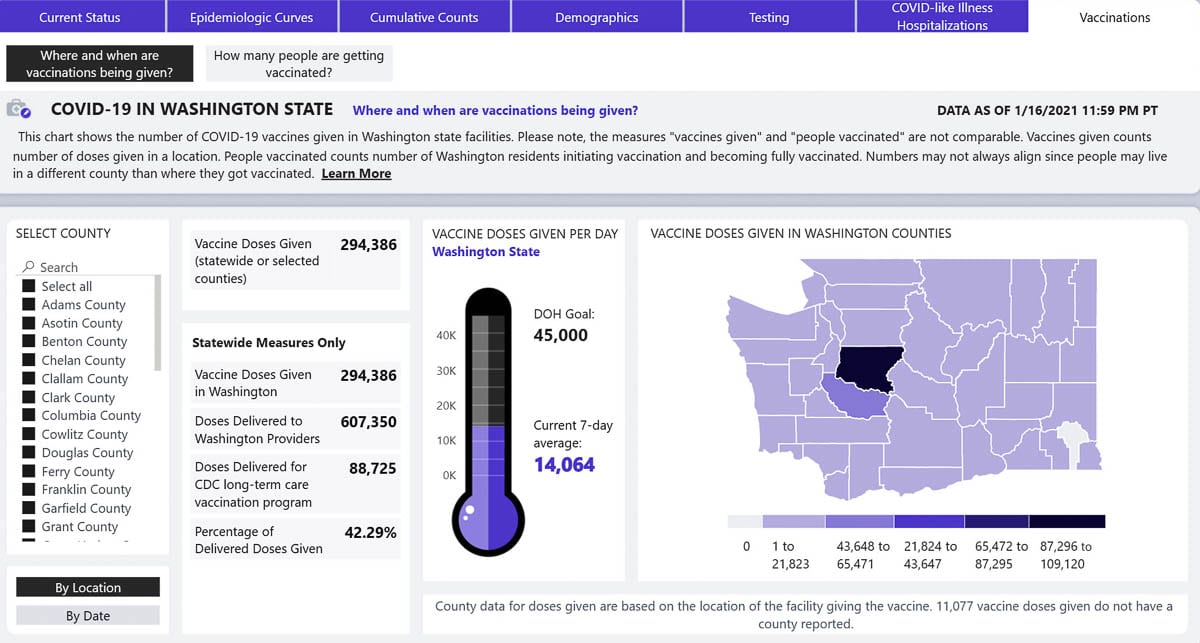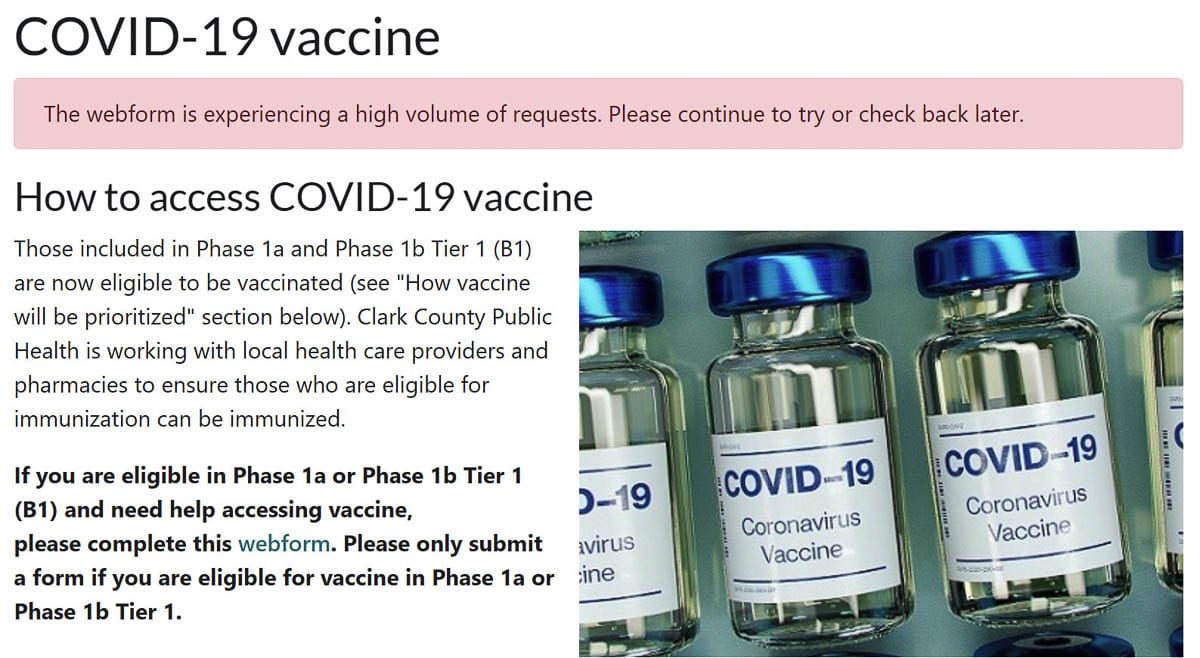Hospital administrators statewide also urged the state to clarify the process for scheduling people who now qualify to be vaccinated
Clark County Public Health reversed course Tuesday, one day after saying it wasn’t yet ready to open COVID-19 vaccinations to people outside of Phase 1A just yet.
While it’s unclear when people over 65, or those over 50 who live in multigenerational households, would begin to actually start receiving vaccinations in Clark County, the Public Health Department said Tuesday that people could begin registering to be notified by a healthcare provider when vaccines are available.

Many people attempting to use the request form on the Public Health website said they were met with long load times, and other errors that left them wondering if their request had been submitted.
“We ask people to please be patient,” said Dr. Alan Melnick, Clark County health officer and public health director. “We’re working with local health care providers to get people vaccinated as quickly as possible, but the demand for vaccine in Phase 1b is far greater than our current supply.”
On Monday, Washington Gov. Jay Inslee announced he was opening vaccine eligibility to the first tier of Phase 1B, and lowering the eligibility age for most people to from 70 to 65
The move was met with some frustration by hospital administrators, many of whom say the uncertainty of vaccine shipments continues to make scheduling exceedingly difficult.
“Hospitals do not get advance notice about what they’re getting or, if they do it’s in the 24 to 48 hour range,” said Cassie Sauer, president of the Washington State Hospital Association (WSHA) on Tuesday. “People now know what they’re getting this week, (but) no clue what they’re getting next week. So that’s quite challenging.”
On Tuesday, the Washington Department of Health launched an update to their COVID-19 data dashboard, which now includes information on vaccine distribution and usage.
The data is being made available through a partnership with Microsoft AI for Health, and will be updated on Mondays, Wednesdays, and Fridays.
“This partnership and expanded data sharing is what we mean when we talk about DOH prioritizing innovation and engagement,” said Secretary of Health Umair A. Shah, MD, MPH. “Ensuring access to this type of data is an important part of our commitment to equity, innovation and engagement. The dashboard will provide a critical window for the public to understand what’s happening in our vaccine response.”
As part of the governor’s announcements on Monday, providers handling vaccine shipments are now required to report vaccinations within 24 hours.
At present, the state has reported a total of 696,075 doses of vaccine delivered, including 88,724 to long-term care facilities from the Centers for Disease Control. A total of 294,386 doses had been reported as administered.
But Sauer said there is one major problem with the state’s data. It’s wrong.
“The data system is clunky,” said Sauer. “We have multiple hospitals who are uploading data into the system and it’s not showing, and they don’t know why. And they’re trying to work with the state to understand why.”

Hospitals around the state insist that they are not sitting on doses, or wasting anything if they can help it. In some rare cases a dose may be discarded if someone who was scheduled for a shot ends up not showing up, and no one on a waitlist can be brought in, but most doses are going into arms as quickly as people can be lined up.
Both the state and local health departments have continued to urge patience as websites are inundated with people trying to find out if they’re eligible to be vaccinated, and where supply might be available.
Hospitals are also feeling the strain as people call or even show up hoping they might be able to get a shot.
“Showing up at a hospital looking for a vaccine is not a system that works,” said Sauer. “And, in fact, it could create real hazards for vulnerable hospital patients.”
Another frustration expressed Tuesday centered around the governor’s call for hospitals to go ahead and schedule appointments based on how much vaccine they expect to receive, and then simply cancel them if the supply isn’t there.
“I believe the public outrage at having a vaccine appointment scheduled and then cancelled will be extreme, and will really undermine the confidence in the vaccine delivery system,” warned Sauer.
The recommendation of WSHA and its member hospitals would be for the state to guarantee a minimum number of vaccine doses, allowing them to schedule people with confidence, and then either bring in more people if supply is available, or shift those doses to other healthcare providers who may not have enough.
“We’re just asking for the public’s patience and willingness to get vaccinated once there are times available,” said Mandee Olsen, a registered nurse and chief quality officer at Kittia Valley Health in Ellensburg. “We’re working as quickly as we can.”
The state has also announced plans to open mass vaccination clinics at several sites, including the Clark County Fairgrounds, as soon as next week.
No further details have been made available, and the hospital administrators on Tuesday’s call said they aren’t expecting that their staff will be used in the clinics, or where the vaccine supplies will come from to supply them.
Sauer did wrap up on a hopeful note, saying that WSHA’s conversations with the incoming administration of President Joe Biden left them hopeful that vaccine shipments will be increasing in the near future, so the frustration currently being felt by 1.5 million Washingtonians who now qualify to get a shot may be temporary.




